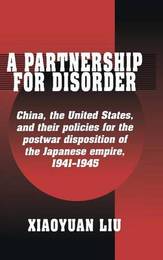
|
A Partnership for Disorder: China, the United States, and their Policies for the Postwar Disposition of the Japanese Empire, 194
Hardback
Main Details
Description
A Partnership for Disorder examines American-Chinese foreign policy planning in World War II for decolonising the Japanese Empire and controlling Japan after the war. This study unravels some of the complex origins of the postwar upheavals in Asia by demonstrating how the US and China's disagreements on many concrete issues prevented their governments from forging an effective partnership. The two powers' quest for long-term cooperation was further complicated by Moscow's eleventh-hour involvement in the Pacific War. By the war's end, a triangular relationship among Washington, Moscow, and Chongqing surfaced from secret negotiations at Yalta and Moscow. Yet the Yalta-Moscow system in Asia proved too ambiguous and fragile to be useful even for the purpose of defining a new balance of power among the Allies. The failure of the system was compounded by its obliviousness to Asia's dynamic nationalist forces.
Reviews'Liu has produced a lucid account based on a wide range of Chinese and American sources.' English Historical Review
|